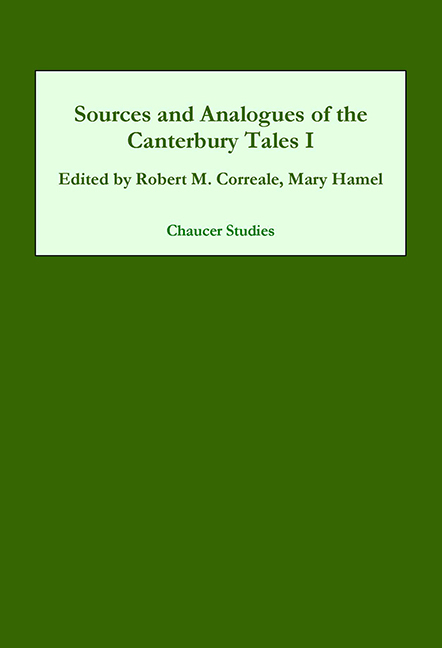Book contents
- Frontmatter
- Contents
- preface
- Acknowledgements
- The Frame
- The Reeve's Tale
- The Cook's Tale
- The Friar's Tale
- The Clerk's Tale
- The Squire's Tale
- The Franklin's Tale
- The Pardoner's Prologue and Tale
- The Tale of Melibee
- The Monk's Tale
- The Nun's Priest's Tale
- The Second Nun's Prologue and Tale
- The Parson's Tale
- Contributors and editors
- General Index
- Index of Manuscripts
preface
Published online by Cambridge University Press: 25 October 2017
- Frontmatter
- Contents
- preface
- Acknowledgements
- The Frame
- The Reeve's Tale
- The Cook's Tale
- The Friar's Tale
- The Clerk's Tale
- The Squire's Tale
- The Franklin's Tale
- The Pardoner's Prologue and Tale
- The Tale of Melibee
- The Monk's Tale
- The Nun's Priest's Tale
- The Second Nun's Prologue and Tale
- The Parson's Tale
- Contributors and editors
- General Index
- Index of Manuscripts
Summary
Bryan and Dempster's Sources and Analogues of Chaucer's Canterbury Tales, first published in 1941, has been one of the most important reference tools in Chaucer studies. It has played a leading role in helping scholars understand and assess how Chaucer handled the many classical, patristic and medieval sources he used in fashioning his masterpiece. In the past sixty years, however, there have been many new developments in the field, and a revised and expanded edition has long been needed. This new Sources and Analogues of The Canterbury Tales is a collaborative effort by an international team of scholars to meet this need. Its purpose is essentially the same as that of its distinguished predecessor – to present the sources in the forms that Chaucer knew them, and where sources are unknown, to present the closest analogues to the tales in the forms with which Chaucer was presumably acquainted.
There are, however, several important differences in content and format between Bryan and Dempster's work and this volume. Several new sources and analogues of the Tales discovered in the past half century (e.g. Friar's Tale, Second Nun's Tale) are printed here together for the first time. Some wellknown sources of others (e.g. Man of Law's Tale, Wife of Bath's Prologue) are re-edited from manuscripts closer to those Chaucer presumably knew and used. Some source texts in Bryan and Dempster have been omitted, including especially Sercambi's Novelle, now known to have been written too late to have influenced Chaucer's idea for the frame of the Tales. The most noticeable difference is the appearance of modern English translations of all sources and analogues in foreign languages. This addition, which will make these texts more accessible to scholars and students of Chaucer, as well as to a larger audience of interested readers of the Tales, has also required expansion of this edition to two volumes.
This first volume begins with a fresh examination of the sources of the frame of the work. Helen Cooper's assertion that Boccaccio's Decameron is the one text “that can stake a primary claim to being Chaucer's model for the Tales” represents a major shift of opinion among a number of scholars who are now willing to credit the influence of this work on The Canterbury Tales, and also signals another distinct change from Bryan and Dempster.
- Type
- Chapter
- Information
- Sources and Analogues of the Canterbury Tales: vol. I , pp. vii - ixPublisher: Boydell & BrewerPrint publication year: 2002



